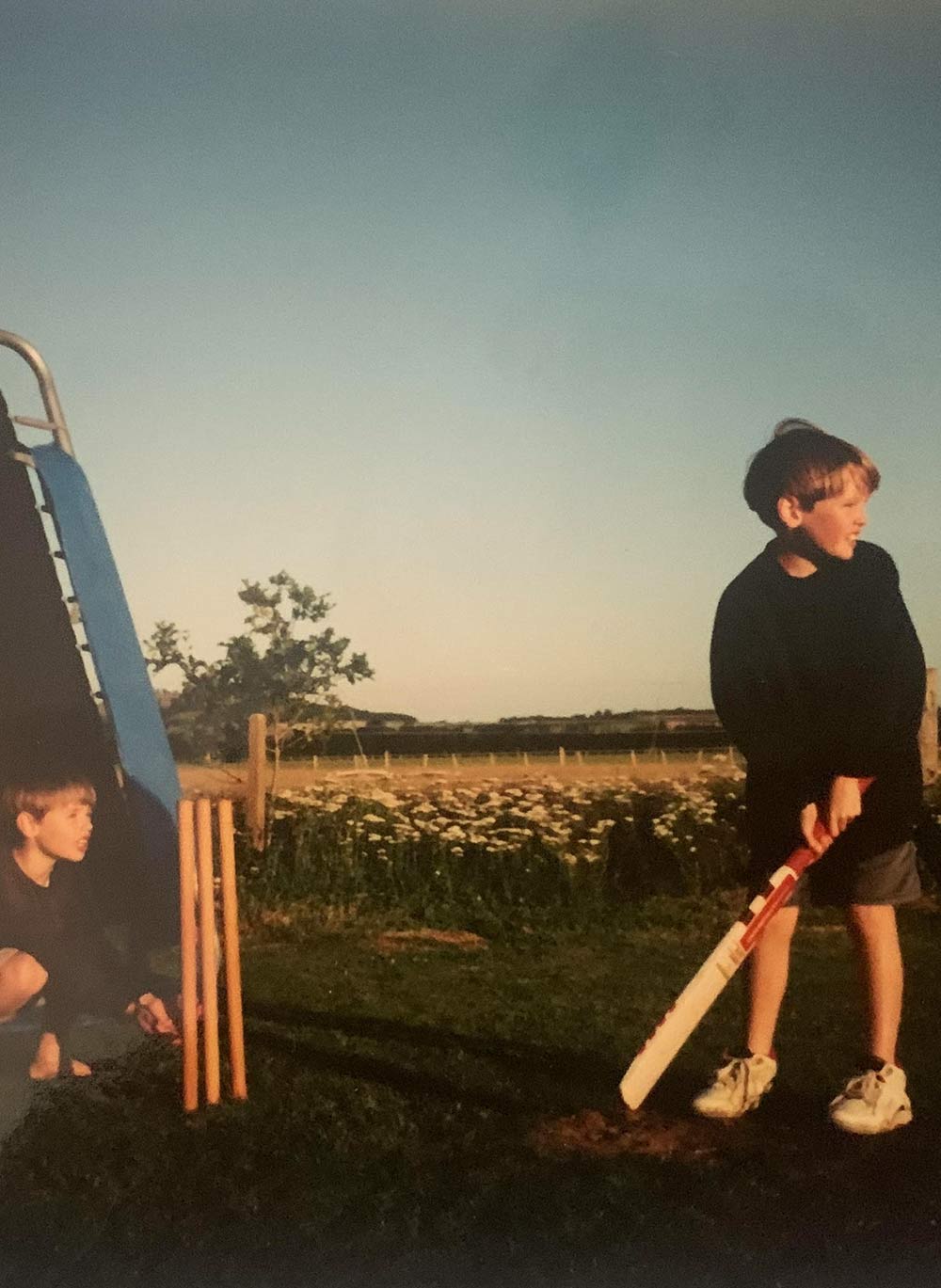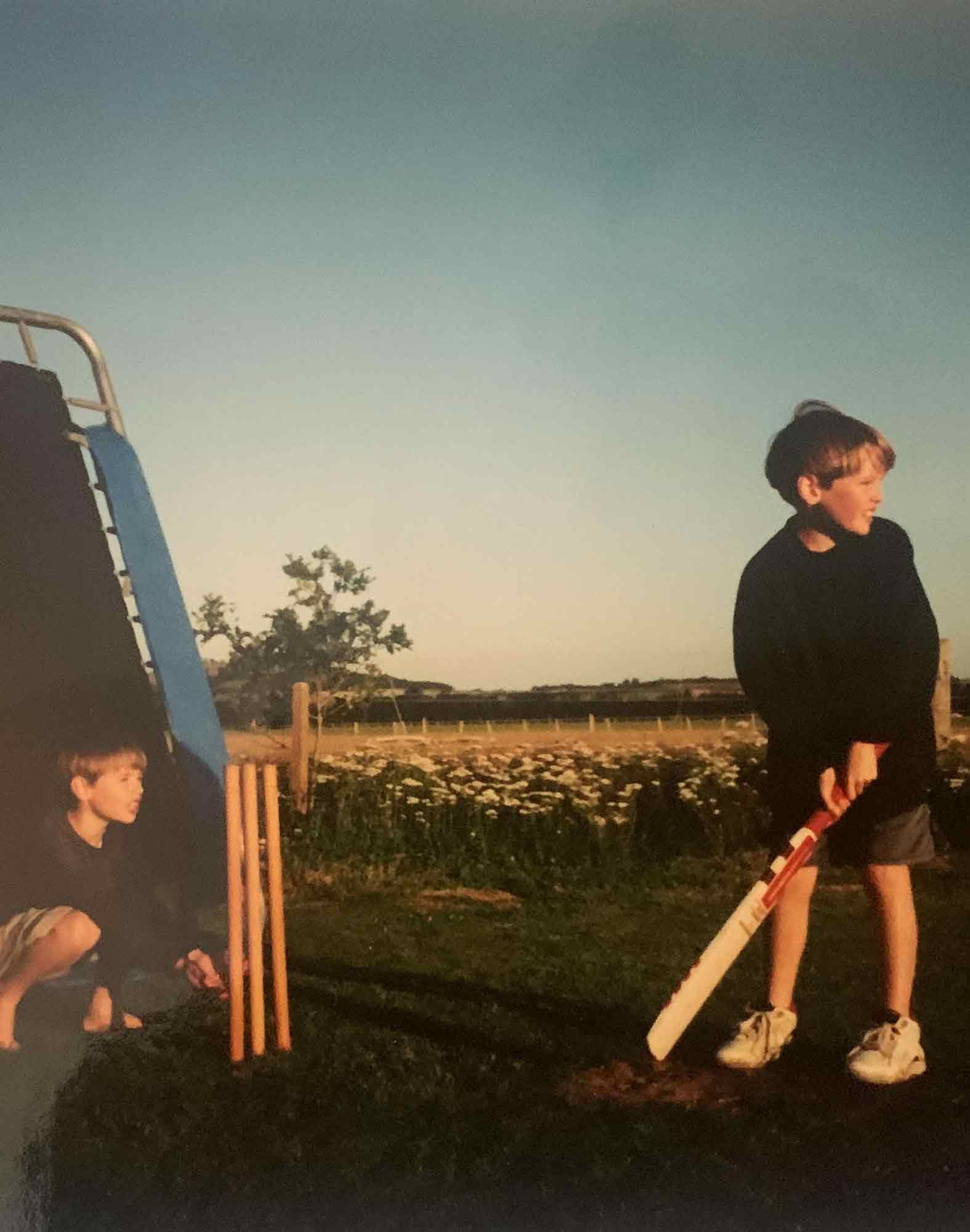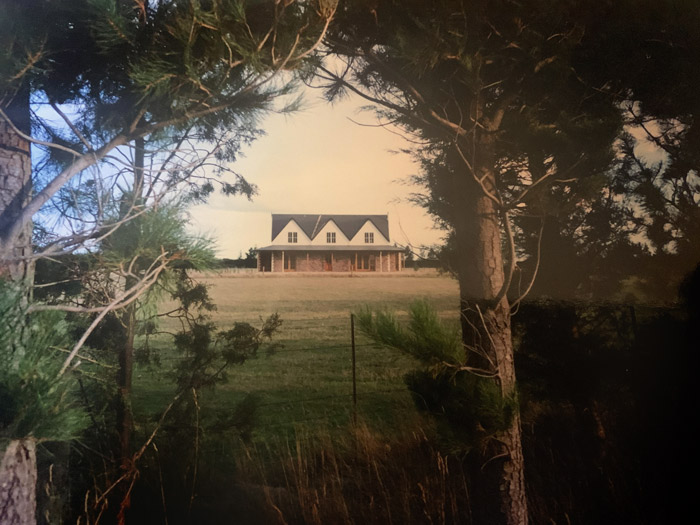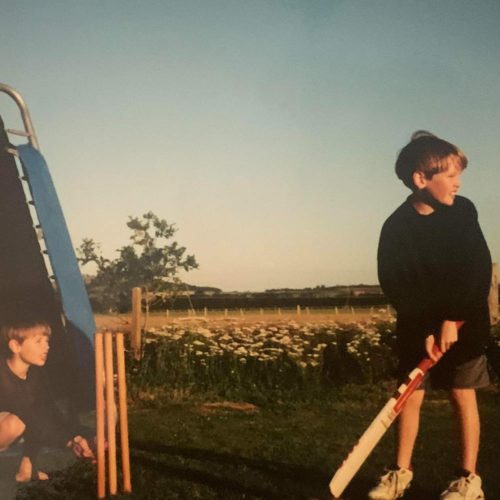

10 days in ICU
Serious childhood injury or illness is every parent’s nightmare. For a child, such an event can become a marker amid the mysterious early years we struggle later to remember. And sometimes, one brush with danger, and the resulting lengthy hospital stay, can echo another case from long ago.
By James Borrowdale
The tan-coloured Holden Kingswood roared along dead-straight German Road, which led to our farm, the Southern Alps in the distance. It was autumn, and the imitation leather of the bench seat was heated by bright but weak sun. It was just Mum and me in the car. She asked what I wanted to do for my sixth birthday.
The memory ends abruptly there, lodged in the mind as the last before my accident for no reason I can name. How I replied is lost, but I do remember, very vaguely, pieces of the birthday. I would celebrate it at home, on leave from hospital, where I was recovering from a broken jaw and a coma from the impact that caused it.
The pony was called William. He was new to the family, but horses had been my mum’s obsession since as far as she can remember back into her African childhood. When she and Dad had immigrated to Aotearoa, it was first to Christchurch, where Dad had a job at the university. But that had just been a staging post for Mum’s true dream, which Dad must have then shared; this hundred acres, with a newly built two-storey house standing undiminished by the landscaping that would eventually grow to shroud its dominion over the flat fields, was its culmination, a place where Mum could learn to farm and that she could stock with horses. William, a gelding, had come from the friend of a friend. He was supposed to be a harmless old thing on which we children could meander down the gravel road that bordered one edge of the farm, where a pine windbreak did what it could to shelter the house from the nor’westers that periodically rolled down from the mountains to claw at the windows.
The scene plays in my mind, falsely, as a memory. A young boy sits atop a grey pony in the fading evening light. His mum walks beside him. The edges of the road are furrowed where the grader has pushed the gravel into the grass. The verges, where sheep or cattle have been grazing, are cordoned off by ribbons of temporary white electric fencing. The rider’s younger brother stands beside the fence, watching the slow parade slide by. Bored or distracted, or just idly passing the time, he flicks the tape. It twangs in a sliver of low sunlight and the pony takes fright, galloping off in the direction of the Ashley River, near where he’d later be found.
The boy still sitting on William – that is, me – goes with him, first clinging with his hands to the leather pommel and then, after soon tumbling off, dragged by the foot that had slipped through a stirrup. After around a hundred metres, our shared progress along the road marked by bloodied gravel, William bucked and kicked. His hoof caught me dead in the centre of my chin. Unconsciousness turned my limbs liquid and my foot slipped free, poured like the rest of me into a puddle on the road.
The mind’s eye looks away at this point: imagination doesn’t as easily reconstruct the kinetics of Mum’s panic, or the shape of the bloody bundle scooped from the gravel and carried back to the house, where my sister had been sent with a shout to call an ambulance.
I was laid on the couch in the downstairs lounge, the big windows looking north in the direction William had disappeared, where Mum, a nurse, did what she could as she waited for the ambulance to arrive. Later, Dad’s grey Honda would pull in to find it parked outside the house.

James’s home, where they waited for the ambulance.
Recently, once more sleeping in a hospital room, I found myself with reason to think again about that experience. One morning, Jacq and I noticed that our second daughter, Tabitha, 10 months old, was having difficulty drinking. She would take a nipple or a teat, suck for a second with her usual gusto then quickly grimace and turn her head away in an emphatic manner that left no doubt you had just been dismissed. Jacq had to go to the office, and in her absence throughout the day Tabby deteriorated. She would occasionally suck water from a cloth or sip it from a cup, but the discomfort of doing so was visibly worsening. By the time Jacq came home early from work, Tabby would take a sip only every hour or so, and then out of utter desperation. Pale white sores had appeared on her tongue and throat; we thought hand, foot and mouth. We dosed her with ibuprofen and paracetamol and hoped for the best, taking shifts throughout the night to have her sleep in our arms, which was the only way she was able to draw enough comfort to rest.
Winona, our three-year old, who breezed through her own infancy in sunny good health, asked in the morning whether Tabby was still “feeling poorly?” She was, and it was Saturday – our local clinic shut for the weekend – so Jacq took Tabby to the A&E as I entertained Winona at home. Overnight, Tabby’s sores had grown into an archipelago of pronounced white disks adorning her tongue and throat, and her breath – usually a baby’s sweet, milky loveliness – had taken on the horror scent of decay. Not hand, foot and mouth, the doctor said, after a four-hour wait, but a different viral infection, which he thought would pass in a day or two.
By now her nappies, which usually fell to the wooden floor with a satisfying sodden slap, were so dry they seemed almost to float from the hand, as when you lift an object you have subconsciously assumed was going to be much heavier. The night and next day passed in bouts of fitful sleep, with intermissions of sad, slow-eyed lethargy, and when, that evening, Tabby’s temperature rose steeply for the first time, we lost faith in that first doctor’s diagnosis. Jacq bundled her up and off to the hospital. The on-call doctor immediately diagnosed her with the cold sore virus – Human alphaherpesvirus – and said she should’ve been admitted the day before. A nurse measured the distance from her nose to
her tummy, and then, as Tabby writhed against the discomfort, pushed the tube up her nostril and down her throat until one end had settled in her stomach. The external section of the tube was taped over her cheek and looped over an ear to hang halfway down her back. Rehydration commenced. It is how she would be fed for the next 10 days.
Winona and I drove to see her the next day and found her wrapped around her mum in a consultation room in the paediatric ward of Waitakere Hospital – she’d been transferred that morning after a night in Middlemore – where the doctor told us to prepare for a lengthy stay. In her room, we arranged the selection of toys and clothes I had brought from home. Winona and her mum left once the novelty of the hospital had ceased to excite the former, and I faced my panicky first day and night; time was measured not by the usual diurnal rhythms indicated by the slow-changing shades of the frosted-glass window, but by the schedule of pain relief, administered through the tube by soft-shoed nurses: paracetamol every six hours, ibuprofen every eight, morphine when neither was enough. Tabby, when able during those first days, slept and slept and slept. Being awake meant pain – and pain without the context that accrues as we acquire language and knowledge. For her, as far as she could know in the eternal present of a baby’s mind, the parameters of existence had just undergone a sudden and awful alteration.
“Life is first boredom, then fear” Philip Larkin wrote. Hospital inverted the phrase, those fearful first days replaced, when it was clear that she would be okay after time and rest, with the tedium of life in a small room with a miserable baby. And life, for the rest of us, continued – a couple of days a week at daycare for Winona, deadlines for me. Jacq took time off work and we alternated nights at the hospital; the single bed, when Tabby was once again able to sleep in a cot, was spread thick with notes and typed-up interviews as I chipped away at a magazine feature whose deadline loomed. Tabby’s schedule was by now all over the place. She was liable to wake – fully, and demanding committed distraction – just as I was contemplating closing the laptop and sleeping myself.
It would be off to the sad little playroom – Tabby’s blue eyes sunk deep into her skull and absent their usual bright curiosity, her look of gormlessness increased by the saliva she was too sore to swallow that saturated an endless series of bibs – to find what entertainment we could among the ripped pages of its books, its missing puzzle pieces, its Lego-head choking hazards.
As Tabby continued to improve, the windows of her wakefulness lengthened and the circumference of our lives expanded along the hospital’s long corridors, into its interior gardens, into the empty peace of its chapel; then to its surprisingly lovely grounds, and out past the ward where both girls were born and onto grim Lincoln Rd. These wanderings were always journeys into memory, too. The hospital’s off-whites and quiet greens brought the jumbled scenes of my own childhood hospitalisation rushing to mind: waking in the dark to the muffled night-noises of the ward, with a vague sense of the weight of what had happened; the colour of the school uniforms worn by visiting friends; the Lego pirate ship I was given for my birthday; Mum wheeling me – I wouldn’t walk completely unassisted for a few weeks – under the blue-whale skeleton at the Canterbury Museum; the visit home on the day of my sixth birthday, when momentarily alone and determined to walk, I made a few tentative steps before collapsing on the floor of the lounge and crawling back to the couch.
A few months after Tabby came home, I decided to test those memories against the bureaucratic record. The hospital file – it arrived in my inbox as a PDF of a scan that retains the stains and spelling mistakes of the original – tells me I was admitted at 20.06 on the evening of the accident. Mum had picked me up in a “deeply unconscious” state, but when I was assessed in the Emergency Department, I was opening my eyes on command and moving my limbs. Later, I would slip again into a deeper unconsciousness, unresponsive
to everything but pain according to the “coma scale” in the file. The two pieces of my lower jaw, split almost exactly down the middle, were audibly grating against each other – the vaguely onomatopoeic term for the noise is “crepitus” – whenever I moved, or was moved. I had a sublingual haematoma: a mass of swelling under my tongue.
A nurse would, just after 3am, witness me suffer a brief convulsion: “both arms twitching, eyes rolling up in head”. Mum once told me that, worried about undetected damage, she had invented the seizure and told the nurse it had happened so they had no option but to send me for a CT scan. The notes, however, suggest it actually happened, that maybe the trauma also played on Mum’s memory, in a different way; regardless, the scan came back normal. I apparently “spoke once to mother” that first night, but the accompanying observation chart only records ticks in the “incomprehensible sounds” column, with the word “GROAN” sometimes written alongside in longhand.

A childhood of horses and cricket.
The characters of Mum and Dad emerge most poignantly from those yellowed pages, their presence beside my hospital bed recorded in their signatures on various forms and sometimes made explicit in the nurses’ commentary. As I scrolled through the pages of parental terror transcribed in the nurses’ scruffy handwriting, my own vigil at my daughter’s side flooded my mind. How much worse it must’ve been for my parents, hovering above an unconscious child with the pieces of their life swirling in the air, not knowing how catastrophically they might fall. “My son James,” Mum writes on one form, where only my name was required, as if urging me to go on being that, and not the thing whose end you would record elsewhere on those forms: “Cause of Death”. Mum is “anxious and exhausted” at first mention, in a paragraph noting the patient “continues to dribble blood”. “Both parents present,” the next nurse on duty writes. “Very anxious and needing lots of reassurance. Parents finding whole situation very upsetting and not coping at times.”
A day after I was admitted, the doctor told my parents he expected me to rouse within a day or two – and, that evening, a note records “semi-conscious, periods of consciousness”. At 9pm I “said yes appropriately” and tried to sit up. But it was the words “Why can’t I eat?” that Mum remembers telling her that I would be truly okay. I was nil by mouth – it would be a while before my jaw was able to tolerate anything more solid than stewed apples or porridge – and a sign on my bed told the staff Iwas not to be fed. I read it and I wanted to know why. Brain damage had been another possible consequence of the injury; Mum says she knew then I had most probably avoided it.
“Parents coping well,” a nurse notes a few days later. “Noticing improvement.” After four days in hospital, I was well enough to be put back under for surgery, the doctor making an incision where my gum meets my lower lip, making a kind of tent out of the skin over my chin, and screwing two metal plates laterally across the fracture to rejoin the errant pieces of my mandible.
The hospital milestones henceforth – “taking small sips orally” or “red jelly x 2 bowls!”, a few steps with the help of a walking frame – are interspersed with comments detailing my irritability and pain. I was in the habit of loudly crying out “I’m not well”, a phrase that plays now in my mind in the exact tenor of my older daughter’s voice. I hated to be touched. But soon phrases like “fairly good afternoon” or “much more settled” start to appear in the narrative. After eight days, I was allowed out for my birthday and apparently “blossomed” at home; it prompted Mum to push hard to take me home for good, which she did, wheeling me out 10 days after I was admitted.
Later, I would relearn to tie my shoes and return to school, gradually increasing my hours until I was again doing a full day. My physiotherapist would write a month and a half after the accident that I had “returned to the cheerful cooperative boy” I had been, though I still walked with an “occasional unsteady step”. Seven months after that, I was “doing better” at school than before the accident, according to the Neurosurgical Registrar. “The only thing his mother has noted is that he is somewhat more emotionally volatile and argumentative than before his accident”. Life for the most resumed its normal childhood ascent through age.
I read through the 70-page account of my accident in one sitting. When I looked up from my laptop I felt, glowing malevolently in my stomach, the exact same ball of jittery nervousness I remember from Tabby’s early days in hospital. It struck me that I have roughly the same access to that little boy’s experience of hospital – mostly deleted by trauma and time – as I do to that of my infant daughter’s. She hadn’t yet begun to bridge the divide between us with language. But she had other ways to communicate as she continued to improve, signalling in tears her boredom with the confines of the hospital room and the insufficiency of the rotating cast of toys and books brought from home and meant to enliven it.
It was a week before she would allow even a sip of water down her throat, a day or two longer before her first experiments with the puree being delivered three times a day by the orderlies. One day towards the end, she grabbed at the muffin I held in front of us as I walked us down Lincoln Rd in search of a coffee to go with it, lifting sugar-laden morsels to her mouth.
Taking her bottle remained dependent on where in her pain-relief cycle the feed fell, until a Wednesday morning when I woke to news that Tabby, in the comfort of her mum’s arms, had gulped all her milk overnight. I dropped Winona at daycare and drove to the hospital. When it was time for a bottle, I took Tabby on my lap and tucked her head into the crook of my left elbow, watching the milk disappear from the bottle in gluttonous draughts. Soon a nurse would come to ease the tube from her nose, and then we waited a few interminable hours for the paediatrician to discharge her. Finally, 10 days after she was admitted, the three of us walked out – Tabby in the front pack, Jacq and I holding hands – and drove back through West Auckland to our house in the Laingholm bush.
James Borrowdaleis an award-winning journalist and author. He lives in West Auckland with his partner and two daughters.
This story appeared in the July 2023 issue of North & South.


